Table of contents
A Complete Guide to Brand Tracking [2025]
Your brand is one of the most valuable intangible assets you have. Tracking your brand online will provide you with many valuable insights.
What is brand tracking?
Brand tracking is an ongoing process that involves monitoring and measuring various aspects of a brand’s performance, perception, and presence in the marketplace over time.
It provides you with valuable insights such as:
- Which source delivers the most mentions,
- What’s your brand health and awareness,
- What’s the sentiment around your brand,
- What’s your social media and non-social reach,
- What are your Reputation and Presence scores,
- How your brand compares to competitors,
- Who is talking about your brand,
- Trending hashtags that match your business,
- What are the most popular topics your target audience is talking about.
Start brand tracking! Measure reach, sentiment, and many more!
Brand tracking typically involves collecting and analyzing data from various sources, such as media monitoring, surveys, social media, sales figures, and customer feedback.
The analysis will indicate what aspects of your brand’s online presence you should improve.
To get actionable insights, you need to track your brand over a long period.
Only that way can you identify the important changes in your target audiences and distinguish them from seasonal fluctuations.
Your brand success depends on the ongoing research you conduct.
How to track your brand? 4 Steps
01 Set objectives and KPIs
Clearly state what you want to achieve with brand tracking. It could be improving customer satisfaction, increasing brand awareness, or assessing the ROI of a marketing campaign.
Choose metrics that align with your objectives, such as Net Promoter Score (NPS) for customer satisfaction, website traffic for brand awareness, or conversion rate for marketing ROI.
Check: How to Conduct a Brand Analysis? Track Key Metrics
02 Utilize brand tracking methods
Tracking a brand involves utilizing various methods and brand tracking tools to collect and analyze data from different sources.
Here are some common methods and tools you can use:
Brand tracking surveys
Brand tracking surveys are a type of market research tool you can use to monitor and assess the performance and perception of a brand over time.
These surveys provide valuable insights into how a brand is perceived by its target audience, how it compares to competitors, and how it is evolving in the minds of consumers.
Depending on the scale and method, surveys can be expensive and time-consuming. Furthermore, if the survey is not well designed, it can deliver skewed results.
Media monitoring
Media monitoring plays a critical role in brand tracking by helping you keep tabs on your brand’s image, reputation, and performance in the public domain.
It involves scanning various channels such as news, forums, blogs, podcasts, newsletters, reviews, and social media platforms for mentions and discussions about your brand, products, or services.
With a media monitoring tool like Brand24, you will be able to:
- Build strong brand awareness,
- Discover brand perception,
- Check the brand sentiment,
- Conduct competitor analysis,
- Measure brand health,
- Manage crises,
- Manage online reputation,
- Discover consumer insights,
- Monitor influencers,
- Track hashtags and campaigns.
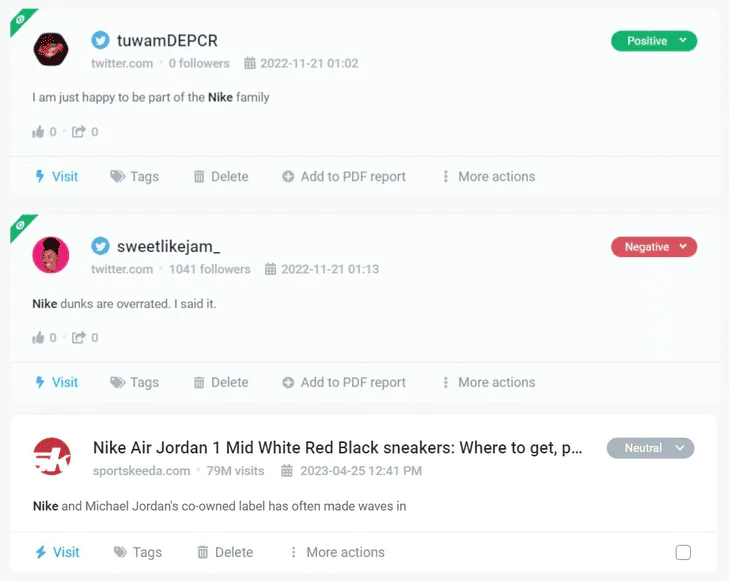
Online analytics
Using analytics tools can provide valuable insights by offering a comprehensive view of how users interact with your website and online content.
- Online analytics can help you measure:
- Website traffic and engagement,
- Audience demographics and interests,
- Source of traffic,
- Conversion,
- Campaign,
- Content performance,
- Site speed.
Brand monitoring tools like Google Analytics provide measurable metrics that can be utilized to evaluate different aspects of brand performance. These metrics include website traffic, engagement, conversion rates, and more.
You can also use SEO tools like Ahrefs of Semrush to discover organic and paid keywords, backlinks profile, domain rating, and other key metrics of your brand.
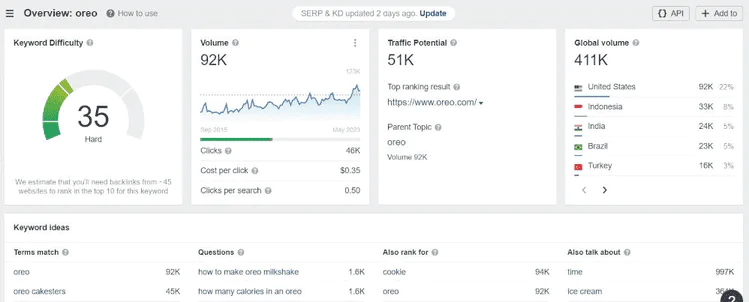
Try AI-powered Brand Tracker!
Reviews and ratings analysis
If your brand is present on review websites like Booking, Trustpilot, Capterra, etc., you should pay attention to opinions left there.
Reviews and ratings analysis can be a powerful tool, as it provides direct insights into how customers perceive and experience your brand’s products, services, and overall customer experience.
By analyzing reviews and ratings, you will learn more about the:
- Customer satisfaction,
- Product and service quality,
- Brand image and reputation,
- Customer experience.
Sales data analysis
Your sales data offer a direct and quantitative measure of your brand’s performance in the market.
Understanding which products or services contribute most to your revenue can help you focus your brand’s direction.
Sales data analysis can help you measure:
- Revenue and growth,
- Market share and positioning,
- Customer behavior,
- Seasonal and temporal trends,
- Sales channels performance,
- Return on investment (ROI).
03 Collect and analyze data
For best results, I recommend you use all 4 methods I listed above.
Using all these sources gives you a more comprehensive understanding of your brand, from public perception to user behavior to financial performance. For example, a drop in sales could be correlated with negative media mentions or a spike in website bounce rate.
For the purpose of this article, I will show you how to track a brand using a media monitoring tool.
Collecting and analyzing data from media monitoring tools can significantly impact brand tracking. They provide real-time insights into public perception, competitive landscape, and brand growth.
Let’s check which brand tracking metrics it can present you.
First of all, you can track the volume of mentions and sources that deliver them.

Thanks to mentions and reach chart, you can track brand growth over time.
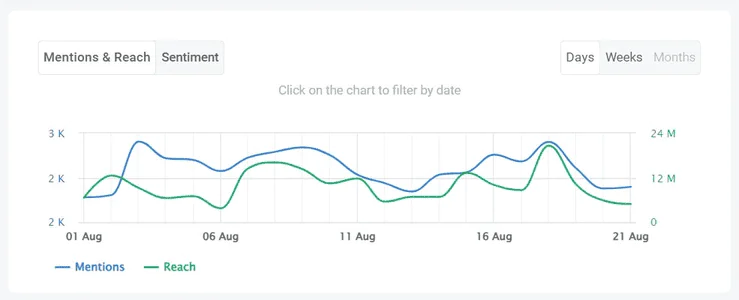
Media monitoring tools often include sentiment analysis, which gauges the overall tone (positive, negative, or neutral) of mentions of your brand across various channels like social media, news, blogs, forums, etc.
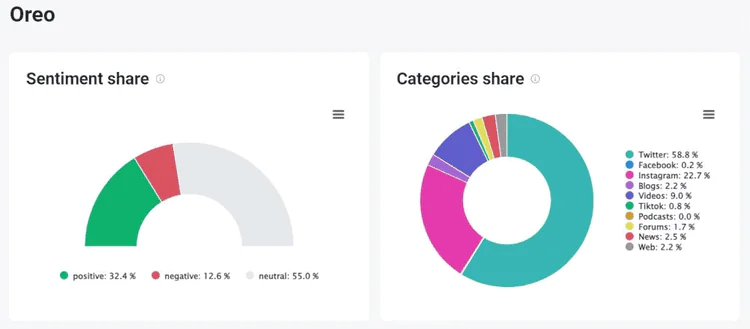
Thanks to the sentiment chart, you can track any spikes in positive and negative mentions.
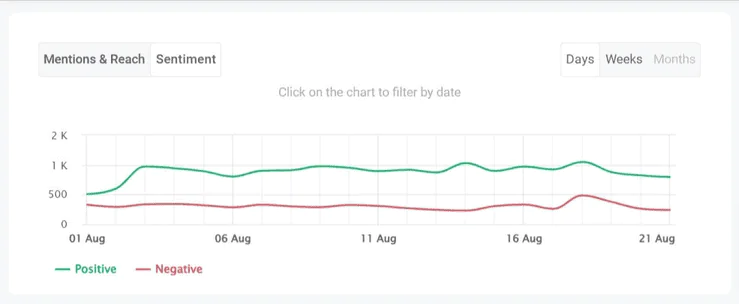
Knowing who is talking positively about your brand can help you identify potential brand advocates for future collaborations.
By identifying and analyzing negative comments, you can take immediate action to mitigate issues and improve your brand’s reputation.
Media monitoring tools allow you to track mentions and sentiment regarding your competitors, providing a valuable context for your own brand performance.
Here you can see the comparison of Oreo and KitKat:
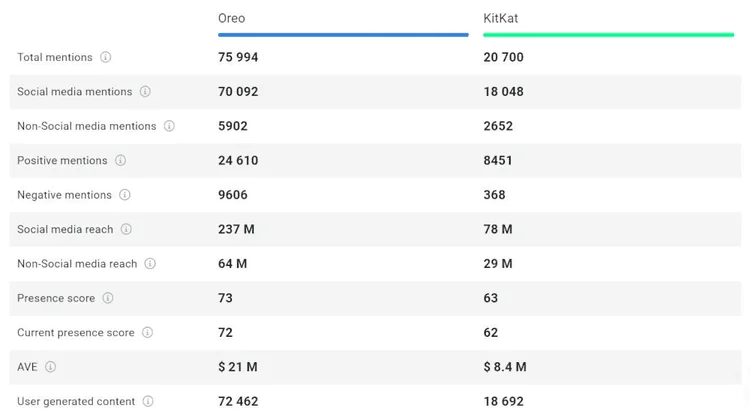
What’s interesting you can monitor your online reputation and presence.
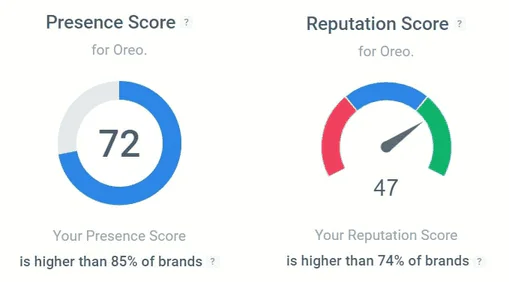
Users often share their experiences and opinions about products and services on social media.
Social listening allows you to collect unsolicited feedback, which can be more candid than responses in formal brand tracking surveys.
Tools like Brand24 can provide a range of key brand tracking metrics, such as share of voice, AVE, social media reach, non-social reach, interactions, and AI mentions from LLMs like ChatGPT, Gemini, or Preplexity.
All those key metrics and features will help you better understand your brand perception.
Try AI-powered Brand Tracker!
04 Monitor continuously
Combining data from different sources helps in generating actionable insights.
Knowing what the public is saying about your brand (media monitoring), how they interact with you online (analytics), how they feel (surveys), and how these factors influence buying decisions (sales data) allows for a nuanced, data-driven brand strategy.
Continuous brand tracking is essential in today’s fast-paced and competitive market for several key reasons:
- Consumer behavior, market trends, and competitive landscapes change rapidly. Brand tracking helps a brand stay aligned with these changes.
- You can manage their reputation more effectively by monitoring sentiments and conversations around the brand.
- It helps to measure progress toward long-term objectives and strategic goals.
- Ongoing customer feedback helps in the improvement of products and services.
- Regular monitoring of sales data helps in accurate forecasting, pricing strategies, and inventory management.
The benefits of brand tracking
Now that you know what to measure, you probably wonder why to go through all the trouble.
The answer is simple — brand tracking will help you assess your brand’s health.
Tracking all the metrics listed above is the backbone of your strategy. Brand tracking tackles the root problem your company can experience. The process focuses hugely on your consumers’ needs and expectations.
If you want to build products or services that stand out in the crowd, help your customers succeed, and increase brand loyalty, you need to track your brand.

Discover our client’s success story — read the case study.
With brand tracking, you can assess the results of brand campaigns. You can identify the issues your non-customers have and turn them into your consumers.
Your audience needs will change. The sooner you see the trends, the better product you will be able to offer. That’s how you beat your competitors, grow your brand, and become an industry leader.
The disadvantages of brand tracking
There are, however, some drawbacks when it comes to tracking your brand.
First of all, take a closer look at the quality of your data. There are tons of online articles, photos, social media posts, mentions, and so on. Some of them are not relevant and will not help you protect your brand reputation or build brand awareness.
Secondly, manual brand tracking is a time-consuming process. Considering the amount of online content produced every day, it will take you hours to search through all the online sources and analyze the relevant ones.
Try AI-powered Brand Tracker!
Is brand tracking worth the effort?
Many industry experts will answer this question shortly — yes, it is! Tracking the data about your company, products, or services will answer many different questions and help you position your brand as an industry expert.
Real-time brand tracking can have many different use cases across various departments of your organization.
The process will help you develop the right branding strategy, increase customer loyalty and customer lifetime value, implement dedicated customer service solutions, track marketing activities, or even choose the business software that suits marketers’ needs.
Tracking brands gives you the level of expertise you need to grow. Brands that implement this strategy can offer services that fulfill their consumers’ needs.
What is an example of brand tracking?
Brand tracking typically involves the regular collection and evaluation of data regarding a brand’s performance. An example might be a brand tracking survey, which gathers information from consumers about their awareness of the brand, their perceptions, and their likelihood of purchasing its products or services. This data can provide insights into the overall brand health, how it’s perceived in the marketplace, and the effectiveness of its marketing strategies.
Why is brand tracking so important?
Brand tracking is crucial for understanding how your brand is performing over time and in comparison to competitors. It can help uncover insights about your brand purchase intentions, brand awareness, and consumer behavior, enabling you to identify strengths and weaknesses in your branding and marketing efforts. By tracking these metrics consistently, you can make data-driven decisions to improve your brand’s position and performance.
What is the frequency of brand tracking?
The frequency of brand tracking can vary based on the brand’s needs, the market volatility, and the brand’s resources. Some companies may choose to track brand usage and brand preference monthly for a more granular look at their performance, while others may conduct quarterly or yearly surveys for a broader perspective. It’s important to choose a frequency that provides timely data without overwhelming resources or creating data fatigue.
What is a brand tracker?
A brand tracker is a tool used by businesses to consistently measure and monitor the health of their brand over time. This is done through periodic surveys and data analysis, which help assess key performance metrics such as brand awareness, brand recall, brand preference, brand associations, customer satisfaction, and likelihood of purchase.






